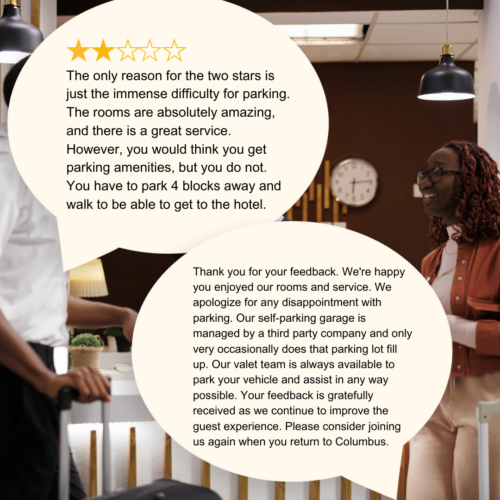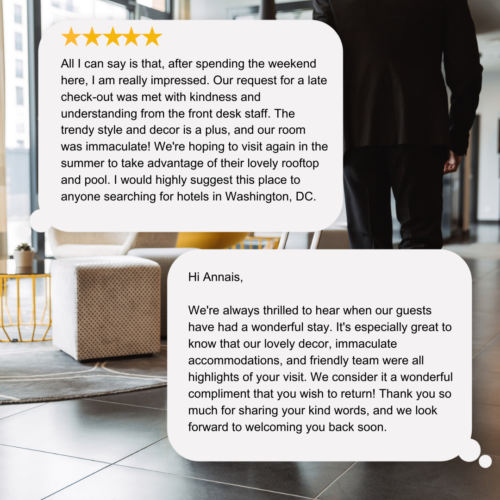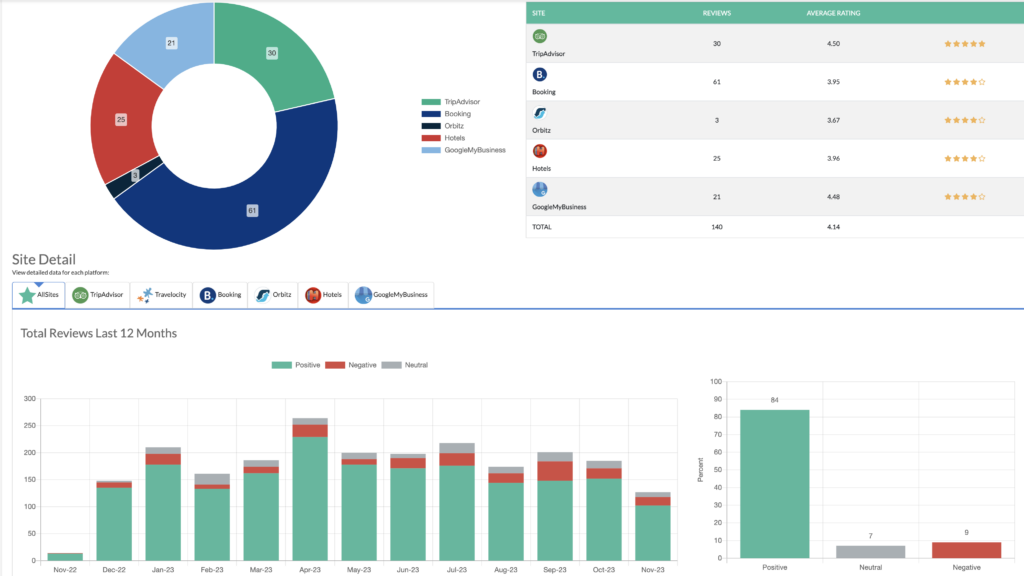Responding to Hotel Reviews – Everything You Need to Know (2024)

Why Is It Important to Respond to Guest Reviews?
As a hotelier, do you find yourself wondering why you should even bother responding to guest feedback? After all, you’re busy attending to the guests that are currently on your property and don’t have time to give attention to guests that have already left. However, what about future guests? Certainly, you want to prevent any obstacles from getting in the way of travelers booking a stay at your hotel. By not responding to reviews, you could be turning away future business.
Responding to reviews allows for a few things to happen. First of all, you’re showing your guests and everyone else that reads your hotel’s reviews that you care about what they have to say. Whether the feedback is good or bad, it’s essential to acknowledge what each review says. Additionally, responding to hotel reviews allows you to clear up any issues or misunderstandings. You can provide additional context to help future travelers understand the situation better.
This would not be a complete guide on hotel review response if we did not mention the unfortunate results of ignoring your hotel reviews. These results can be very severe and potentially irreversible.
The first consequence is the loss of guest attention and interest in your hotel brand. Not staying engaged with your audience ultimately leads to guest dissatisfaction and feelings of neglect.Your repeat audience is a primary source of business so losing them is a significant blow to your hotel’s bottom line.
 Secondly, the ramification of diminishing your hotel’s reputation is irreparable. It takes a substantial amount of time to create a credible and respectable hotel reputation, but in the blink of an eye it can be ruined and lost forever. Hotel reviews make up the backbone of your hotel’s digital infrastructure and known reputation.
Secondly, the ramification of diminishing your hotel’s reputation is irreparable. It takes a substantial amount of time to create a credible and respectable hotel reputation, but in the blink of an eye it can be ruined and lost forever. Hotel reviews make up the backbone of your hotel’s digital infrastructure and known reputation.
Third, your property’s downfall will allow your competitors to capture more of the market and permanently fill your spot. Uprooting them after they cement themselves is practically impossible.
Finally, the most obvious consequence of neglecting to respond to your hotel’s reviews is fewer bookings at your hotel. Less bookings means less revenue which in turn may signal going out of business. It’s clear that not responding to hotel reviews is a critical mistake, but outlining just how decisive it is hopefully motivates you to continue response writing.
Establishing Your Review Response Voice
The beginning of your hotel review response journey will require you to establish a distinct digital voice that distinguishes your brand. This voice will need to be recognizable because it is an asset that separates your hotel(s) from competitors. Use this new found voice to connect with your guests and inform them of any relevant information that pertains to your property. For instance, any planned or underway renovations are great details that guests should be aware of.
You can even discuss ongoing sales or promotions that your hotel is offering in your review responses as a way to keep your audience in the loop. Keep in mind that consistency is key when implementing your online review response voice. You need to carry the same tone throughout the entirety of the response from intro to signature.
 This degree of attention to detail
This degree of attention to detail
gives readers the impression of professionalism and care toward your brand. Positive emotions such as those will elevate the brand image of your hotel and maintain a high level of standards.
How Quickly Should You Respond to Reviews?
If you’re one of the hoteliers that makes an effort to respond, how often are you doing so? Once a week? Once a month? Whenever you have the extra time? Chances are, you’re not responding to each review as they come in. With the continued staffing shortage, it can be hard enough for employees to manage day-to-day operations, let alone for someone to be dedicated to responding to reviews.
Regardless of these circumstances, travelers expect quick replies. Short turnaround times are also in line with what many brands expect. Whether or not your hotel’s brand requires you to respond within a certain timeframe, you should still make an effort to respond as quickly as possible for your guests. A good way to ensure you never miss a review is by setting up alerts, so you are notified each time you receive a review.
Should You Respond to Reviews With No Comments?
Have you ever received a review with only a rating but no comments? This can cause some confusion over what you should do. On the one hand, the guest left feedback, on the other hand, there’s no content in which to respond. It may be tempting to respond to a 5-star review to thank the guest and invite them back. However, responding to rating-only reviews is not recommended because it can damage your hotel’s credibility.
If travelers browsing your reviews see responses to ratings without comments, they may think bots wrote the hotel review responses due to a lack of personalization. Additionally, when there’s no content to respond to, you are limited in what you can say. This can lead you to write canned responses and give the impression that your hotel doesn’t put in the effort to create individualized replies. At the end of the day, you want to leverage your reviews to show travelers you care about the guest experience, even after check-out, and doing anything to jeopardize that impression should be avoided at all costs.
Respond & Resolve™
Get Professional Responses
to Every Review on Every Platform.
How to Respond to Negative Reviews
Negative reviews are a hotelier’s nightmare. Resolving these reviews is a priority to salvage your hotel’s reputation and rectify any guest issues. The first step toward a resolution is responding to the guest who left negative feedback and knowing to handle it correctly. This can be challenging for many hoteliers as it may be frustrating to hear negative comments about your property.
That being said, it’s important to try to take a deep breath if a review is particularly difficult to read.
You want to be in a calm state of mind so you can respond respectfully and professionally. How you respond shows the guest who left the review and future travelers what kind of guest experience they will receive.
Getting defensive will only turn those travelers away. It’s also important to respond as quickly as possible. The sooner you respond, the more likely you are to remember the details of the situation. It also shows travelers that you worked promptly to resolve the issue at hand. In your response, you should mention any actions that you took to rectify the situation. Travelers want to see that you’re proactive and that the changes implemented will improve their stay.
Sometimes you will come across negative reviews regarding more delicate situations than noisy neighbors or disappointment over breakfast options. One of those cases is when a guest complains that they feel discriminated against at your property. The first step in dealing with this kind of review is to just stay calm. Don’t launch a keyboard tirade against the reviewer because that kind of response is off-putting to travelers. Instead, take a moment to discuss this review with your staff to gain their perspective and add context to the review. You can also use this opportunity to train your staff on non-discriminatory behavior. Finally, in your response to the guest, emphasize your hotel’s anti-discrimination policies and apologize for the guest’s experience. In order to end the response in a positive light, assure the guest that action will be or has been taken to address their concerns.

Example of a real negative guest review and the response provided by the Respond & Resolve ™ digital solution
Other types of negative reviews that should be handled delicately are guest reviews that relate to price. Reviews mentioning the price of room rates, on property additional services, purchasable items, etc. are common areas of criticism found in hotel reviews. Take advantage of these openings and set price expectations for travelers so that you can resolve the issue and avoid future discrepancies. Remember to be understanding and professional in your approach as high costs and economic turbulence can make guests emotionally irrational.
How to Respond to Positive Reviews
You may be wondering why you should respond to positive reviews in the first place. Clearly, the guest was happy, but not quite. While it’s great that the guest had a positive experience at your hotel, you should always make an effort to respond to positive reviews, just like you would respond to negative ones. Responding to reviews shows you care about guests even after they check-out and makes guests feel like you appreciate the fact that they took time out of their day to leave feedback. Making your guests feel appreciated is key to getting them to book again.
So how do you write a response to a positive review? The first step is to address the guest. It may be by their name or username, whatever is available for you to publicly see. Then you want to thank the guest for staying at your hotel and for leaving their review. After thanking them, be specific and tie your response back to theirs so it feels personalized. Guests want to feel heard, so acknowledging something they said in the hotel review response whether it was praising an employee or raving about the on-site restaurant, will show that your hotel listens and make that guest more likely to come back. As you close up the review, remember to invite the guest back for another stay at your property.

Example of a real positive guest review and the response provided by Respond & Resolve™ digital solution
What Not To Do When Responding To Reviews
We’ve covered best practices for responding to both negative and positive reviews. But what about the “worst practices”? What things should you never ever do when responding to reviews, no matter what the sentiment is. There are several big no-nos that can damage travelers’ impression of your hotel and negatively impact your business.
The first rule is to never get defensive. It can be especially hard when faced with a scathing review, but you can never lose your cool and lash out at the reviewer. It’s imperative to stay calm and peacefully resolve the issue in the review. You should also avoid giving out the same response to every guest that leaves a review. Many hotels are short-staffed right now and providing a copy-and-paste response can seem like a good way to save time and still reply to guests.
 However, this erases any sense of personalization and makes guests feel like you don’t care about their feedback. Another pitfall is going against OTA or review site guidelines. Many of these guidelines prevent hotels from mentioning their own website or providing info to contact the hotel directly. Breaking these rules can result in your hotel review response being rejected and never reaching the guest.
However, this erases any sense of personalization and makes guests feel like you don’t care about their feedback. Another pitfall is going against OTA or review site guidelines. Many of these guidelines prevent hotels from mentioning their own website or providing info to contact the hotel directly. Breaking these rules can result in your hotel review response being rejected and never reaching the guest.
To avoid this, you should always double-check the rules of any site on which you’re responding to reviews. The last rule you never want to break is to avoid using your hotel’s name in negative reviews. If your hotel is associated with tons of negative feedback, its online reputation can take a hit, but you can prepare accordingly if you know how to turn a negative review into a positive one to mitigate the damage.
Responding On Social Media vs. Review Sites
Guests don’t just leave reviews on places like TripAdvisor and Booking.com anymore. It’s common to find reviews in all corners of the internet, including social media. There are a few key differences between the reviews that you may be used to seeing and responding to and reviews on social media. It’s important to understand the nuances of social media reviews so you can be prepared to respond to them. There are some general guidelines when responding to reviews on social media. These include responding quickly and concisely, personalizing each response, being as professional and clear as possible, and answering each question without evading or redirecting. Generally, these guidelines are the same no matter where you’re responding, but they’re good to keep in mind.
Social media reviews tend to be more informal than those left on review sites. Guests may casually drop a review in a comment on a friend’s post, a caption to a post shared with their followers, or may even directly tag your hotel. It’s important to keep an eye out for these reviews so you can reply as soon as possible. Another type of review you may encounter is through direct messaging. Some guests may want to bring their questions, comments, or concerns to you privately. They may be in the process of booking, currently staying on property, or already checked out. When you receive a DM, many guests will expect a faster response because they went to you directly. Keep this in mind as you prioritize responses.
What Can You Get Out Of Guest Reviews?

Detailed reputation & online hotel review tracking example provided by TMG OneView®
You may be wondering what benefit there is to responding to reviews. It takes a lot of time and effort, so is it even worth it? We’ve talked about the importance of responding in regards to acknowledging your guests and clearing up issues, but there’s more than you can gain from these reviews: data and insights. By analyzing your hotel’s reviews, you can detect patterns and trends in guest sentiment that can help you make better decisions for your property. Reviews serve as a template to evaluate what’s working and what needs to be improved.
Positive feedback is a great way to tell that guests like what’s going on. Negative feedback, while sometimes painful to receive, can be helpful in pinpointing what your hotel could do better to improve the guest experience. For example, if you receive multiple reviews wishing for more variety at breakfast or stating how the hotel feels outdated, you can make informed choices to add new options at breakfast or modernize your hotel’s style. Feedback is a powerful tool that lets you see exactly what your guests are thinking so you can use it to your advantage and encourage them to come back by making the changes they want to see.
One of the most valuable outcomes that you receive from managing guest reviews is a loyal and thriving online community of people who keep your hotel brand top of mind for their next vacation or business trip. This piece of the puzzle is pivotal because it is easier to satisfy and retain your existing audience than trying to acquire new customers. In the long term, your hotel will have the ability to outlast undesirable revenue periods and outperform your competitors due to your following. A healthy online community and guest review ecosystem is the key to longevity.
The True Cost Of Responding To Reviews
Responding to guest reviews can be costly in many ways. It takes time, money, and effort, not to mention the emotional toll it can have. Hotels struggling with staffing issues often don’t have the manpower to respond to reviews with the frequency and depth that they require.
In addition to it being hard to find someone to respond to reviews full-time, it can be expensive to employ them. Between wages, benefits, and time off, the cost can add up. If you’re a hotelier that makes an effort to respond to reviews yourself, you may find it difficult to control your emotions when you see negative feedback pop up. Managing those emotions can take a toll on your mental health and letting them out over the keyboard in a defensive manner can damage your hotel’s reputation.
Many hoteliers find it beneficial to have a third party respond to their reviews for them. Outsourcing this job allows the employees you already have to focus on guests and manage operations on the property. It also saves hoteliers money. Review response services don’t cost nearly as much as a full-time employee with benefits. Not to mention, these third parties won’t take vacation time, get sick, or suddenly quit.
This saves you the time and effort of finding and training a replacement.
Another benefit to a review response service is that it can remain impartial and professional, saving you the emotional toll that responding can take when you’re personally involved.





0 Comments